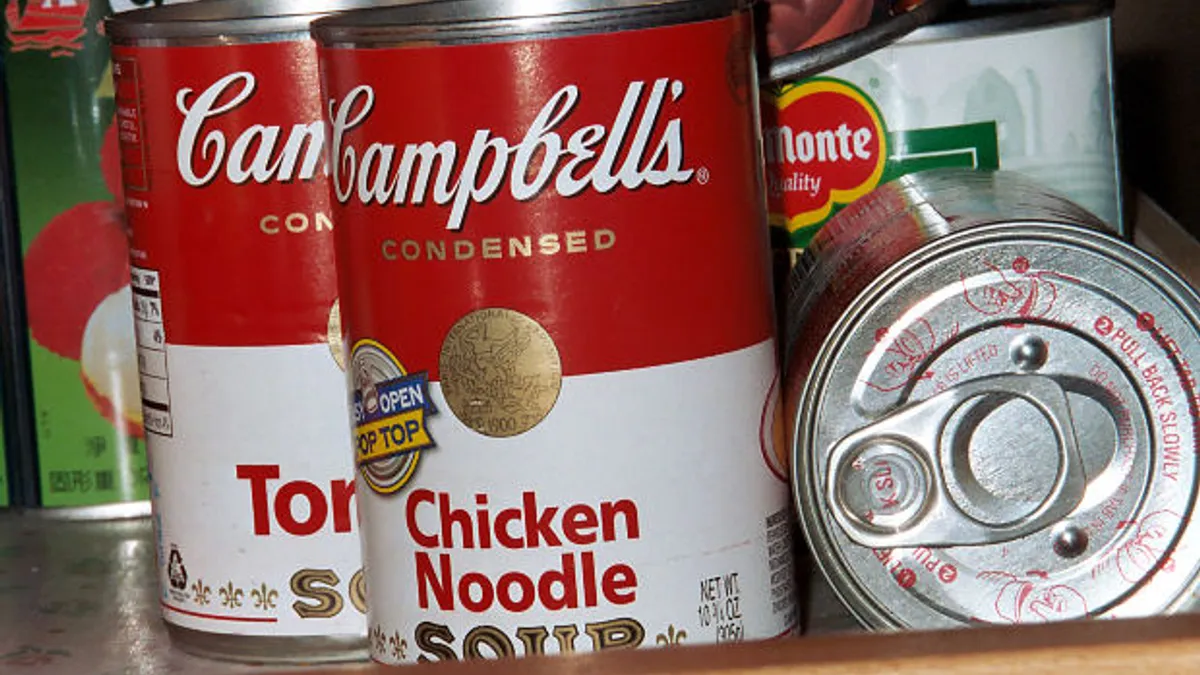Dive Brief:
- A dispute over promotions and pricing with Walmart has apparently led to disappointing sales for Campbell Soup Co. Campbell's reported a 2% decline in organic net sales in the company's second quarter last Friday because an unnamed "key customer" had placed fewer orders. Wall Street Analysts provided the name: Walmart, according to Fortune Magazine.
- As a result of the report, Campbell's stock shares declined 3.27% to $46.17 by the close of business Friday. Other consumer goods manufacturers also have seen declining sales in the U.S., such as Kraft Heinz.
- Campbell's Pepperidge Farms Snacks business did well, but other lines, like Bolthouse Farms juices and fresh food products, did not. Seeing future potential in snacks, Campbell's said in December it would buy Snyder's Lance, which makes Cape Cod potato chips and Snyder's pretzels, for $6.1 billion, its biggest deal ever.
Dive Insight:
Walmart has $165 billion in annual food sales, and lately has been increasing the in-store presence of its private labels while cutting back the inventory of big manufacturers' brands. This is the underlying trend in the decline in U.S. sales for packaged goods companies like Campbell's.
Stir in the trade disagreements that occur from time to time between retailers and suppliers, and a situation like Campbell's arises. The dispute is reportedly over pricing and shelf space promotion and goes back to the second half of last year, reported the New York Business Journal.
Preparing for peak soup sales season in the cold months, negotiations with customers include joint business plans, along with spending and merchandising plans linked to a sales goal, Denise Morrison, Campbell’s chief executive officer said in an August conference call, according to Supermarket News. “And what we seek are win-win-win solutions, win for the consumer, win for the customer and win for Campbell’s. And in this particular situation, we were not able to achieve that negotiation.”
As it emphasizes store brands and plays hardball with suppliers, Walmart is feeling price pressure from limited assortment chains like Aldi, which sells its own brands of highly comparable products for 25% to 50% less than the private labels and national brands at mainstream retailers. Soon Lidl, with a similar business model to Aldi, will join the fray as it expands into the U.S.
Meanwhile, there are Amazon’s direct online sales which include Whole Foods’ 365 private label. Walmart has said it wants its prices to be 15% cheaper than the competition 80% of the time.
This competitive situation is not likely to fade, and traditional supermarket chains are expected to follow Walmart in some fashion. Most, like Kroger, already have robust private labels. The largest chains, like Walmart and Kroger, will hold the biggest sticks, and the impact on CPGs will not be good – they'll have to cut prices, or go home. The prices will undoubtedly come down as they fight to maintain shelf space.








